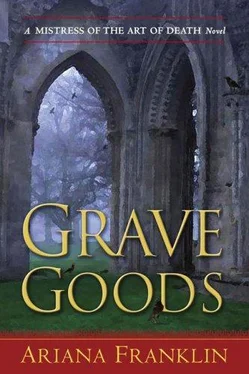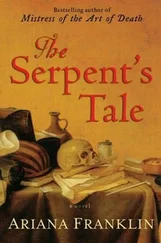“A trial by combat?”
“Trial by combat?”
The inn’s dining table was enlivened; visiting the saints might ensure one’s place in heaven, but earth didn’t have much more to offer in the way of entertainment than seeing two champions trying to kill each other.
It was decided. The pilgrims would loyally accompany their new friend, Lady Wolvercote, on her diversion to the judicial battleground at the Buckinghamshire county town of Aylesbury.
As her party was to be accompanied by too many people for robbers to attack them as they went, Emma felt safe to employ one of her grooms to ride on ahead and take a letter to Wells, where her mother-in-law, Lady Wolvercote, now the dowager Lady Wolvercote, occupied another of the estates that young Pippy had inherited from his father. “It announces my coming,” she told Adelia. “It’s supposed to be the best of the properties, and if I like it, I shall settle there. Somerset is the nicest of all counties. There is a dower house attached to it, I’m told, so the old woman will have accommodation that she’s entitled to move into-that’s supposing that she and I get on together. If we don’t, she can have one of the other estates somewhere else-a smaller one, of course.”
“Have you never met her?”
“No,” Emma said bitterly. “Mine was not a wedding to which relatives, or anybody else, was invited.”
It would be a strange situation-a bride and mother-in-law who were strangers. Adelia experienced sympathy for the unknown woman; with Emma in this mood, the slightest infraction would see the poor lady uprooted from her home and sent to another. She said, “I am sure she will be too delighted at acquiring a grandson to be anything but pleasant.”
There had been no children from Wolvercote’s previous marriage; his first wife had died only weeks after the wedding, leaving him her considerable dowry-circumstances that, knowing the man, Adelia had always thought to be suspicious.
“She’d better be,” Emma said ominously.
THE AYLESBURY JUDGES sat on benches under an awning decked by flags. Another covered stand held the nonlegal rich and important. Lesser mortals, large numbers of them, braved the sun to line the spears that had been set in the middle of the field to mark off a sanded area, sixty feet square.
It was a day out. There were little tents selling ale and sweetmeats. Jongleurs entertained the crowds with songs, legerdemain, and tumbling. Market women sold clothes-pegs and herbs. In the fields beyond, swallows flipped back and forth over the corn strips.
The judges’ herald blew a fanfare before introducing the two combatants in a voice that traveled. “Under the eye of Almighty God, Master Peter of Nottingham representing Sir Gerald L’Havre, and Master Roetger of Essen representing Lord Philip, Baron Wolvercote, shall this day prove which holds the Manor of Tring, with all its appurtenances, by true right.”
The trumpet brayed again. “Let the combatants come forth armed with scutis and bacculis, and swear to the justices that they have abjured all magic in this matter of trial, then let them fight until the God of Battles shall decide, or until the sun shall go down.”
The two champions emerged from a small pavilion near the judicial stand, knelt before the judges’ bench, and spoke in unison.
“Hear this, ye justices, that we have this day neither eaten, drunk, nor have upon our persons neither bone, stone, nor grass, nor any enchantment, sorcery, or witchcraft, whereby the law of God may be abused or the law of the devil exalted. So help us, God and His saints.”
Adelia was in the stands only because Emma had begged her to be; she’d rather have stayed behind at the inn with the children. She had no liking for fighting of any kind-it took too long to put people together again afterward, always supposing they were still alive to let her do it.
The two men strode into the arena. Both carried a shield and a stave. Each wore sleeveless hauberks, leaving the head and legs bare, and each was shod with red sandals-a tradition, apparently-that made them look vaguely ridiculous, like children who’d dressed up as knights without the proper footwear.
Adelia was relieved; staves were surely not as harmful as swords; less bloody, anyway. She said so to Emma.
“In Germany it is the sword,” she was told, “but Roetger is a master with both-and the proper name is ‘quarterstaff,’ my dear, not ‘stave.’ ”
Emma had become edgy; it didn’t seem as if the cheeseparing Sir Gerald had economized this time. His champion was an inch or two shorter and probably a little older than Roetger, but the muscles in his neck, arms, and legs were formidable. So was the sneer that showed confidence and dark yellow teeth.
By contrast the German looked the slighter of the two, and his face was expressionless. Not a man of words, but on the journey Adelia had come to like him, mainly because both children did, always pestering him: “Master Roger, Master Roger.” He had endless patience with them, making whistles from hazel twigs, showing them how to hoot like an owl by puffing into their clasped hands, tearing little pieces out of a folded leaf so that, unfolded, it had a face.
“Does he have children back in Germany?”
“I haven’t asked,” Emma said, with more energy than the question demanded. “He is here to fight; that’s all I’m interested in.”
There was another fanfare. Master Peter, representing the defendant, threw a mailed glove to the ground. Master Roetger, the prosecuting champion, picked it up.
“Let battle commence and God defend the right.”
The quarterstaffs were six feet long and made of oak. Each man grasped his in fighting mode, one hand clasping it in the middle, the other hand gripping it a quarter of the way down so that half the staff was free to do the belaboring.
Except that there wasn’t any belaboring-not at first. There was a lot of jumping as one man tried to take the legs out from under the other, skipping, grunting, loud cracks as stave met stave, but no smites on flesh.
Sitting next to Adelia, Father Septimus, Emma’s confessor, rubbed his hands. “Good, good, proper champions on both sides. We’re in for a fine contest; it will take hours before they tire.”
Hours? And what happened when they did tire and lost the agility to avoid the blows? Those were heavy staves.
The fight had hardly begun and she was sickened by it, by everything, the pavilions, the fanfares, the bunting, the judges, all the banal formality; everything here was tainted, including herself. She thought of Jesus and his plain, provincial humanity and how they were belittling His Father, as in all trials in which God was brought in to decide, diminishing Him to the status of a Caesar presiding over a bloodstained Colosseum, asked to stick up his thumb or turn it down.
She told Emma that she was going to answer a call of nature. Emma, twisting a kerchief in her hands and without taking her eyes off the arena, said, “Come back soon. Master Roetger may need you.”
People who drew in their knees as she passed along the row to the steps merely peered round her, tutting at her momentary obstruction of their view.
A latrine had been dug behind the stands for the occasion; its cloud of flies could be seen even above its wattle fencing. Adelia avoided it and climbed a stile leading to a path through trees, following its way to a stream, the noise of the crowd fading behind her. She seated herself on the grass under a willow tree, took off her boots, and let the water cool her feet.
What am I doing here?
In deserting the fens she’d cut herself off from everything that anchored her. It had been a grief to leave her patients, to say goodbye to Prior Geoffrey, and an even greater unhappiness to make that brief, loving farewell at Saint Augustine’s to Ulf, Gyltha’s grandson, no longer the urchin who’d been her companion but now, under the prior’s tuition, a young man intent on law. And, oh, she would miss Ward. The dog wasn’t welcomed by Emma, and Adelia had been persuaded to leave him in the prior’s care.
Читать дальше












